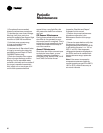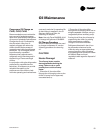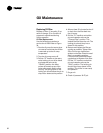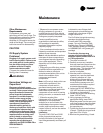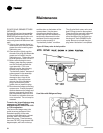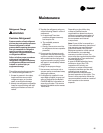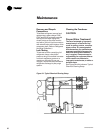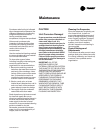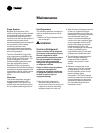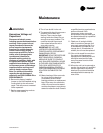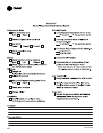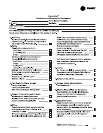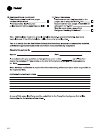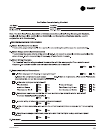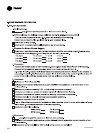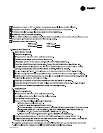
CVHE-SVU01E-EN
98
Maintenance
Purge System
Because some sections of the
chiller’s refrigeration system operate
at less-than-atmospheric pressure,
the possibility exists that air and
moisture may leak into the system. If
allowed to accumulate, these
noncondensables become trapped in
the condenser; this increases
condensing pressure and
compressor power requirements,
and reduces the chiller’s efficiency
and cooling capacity.
The Trane EarthWise Purge is the
only purge system available for the
CVHE, CVHF and CVHG chiller. The
purge is designed to remove
noncondensable gases and water
from the refrigeration system.
EarthWise Purge unit operation,
maintenance and trouble shooting is
covered by a separate operation and
maintenance manual, which may be
obtained from the nearest Trane
office.
Overview
This section describes extended
storage requirements for UCP
installed CVHE, CVHF and CVHG
chillers to be removed from service
for an undetermined length of time.
Unit Preparation
The following steps are necessary in
order to properly prepare a unit for
storage.
1. Remove all liquid refrigerant if the
unit is charged.
ƽƽ
ƽƽ
ƽ WARNING
Contains Refrigerant!
System contains oil and refrigerant
and may be under positive pressure.
Recover refrigerant to relieve
pressure before opening the system.
See unit nameplate for refrigerant
type. Do not use non-approved
refrigerants, refrigerant substitutes,
or refrigerant additives.
Failure to follow proper procedures
or the use of non-approved
refrigerants, refrigerant substitutes,
or refrigerant additives could result
in death or serious injury or
equipment damage.
2. After the liquid refrigerant is
removed, using a recovery or
recycle unit or vacuum pump, pull
a vacuum to remove remaining
refrigerant vapor from the unit.
3. After all traces of refrigerant are out
of the unit, a positive nitrogen
charge should be put into the unit
(6 to 8 psig). This positive pressure
must be checked monthly to
insure no noncondensables get
into the unit. Use a pressure gage
on the evaporator shell to verify
that the 6 to 8 psig dry nitrogen
holding charge is still in the
chiller. If this charge has escaped,
contact a qualified service
organization and the Trane sales
engineer that handled the order.
4. The refrigerant charge should be
stored in proper refrigerant
containers. Due to possible
leakage, do not store in used
drums.
5. Maintain control power to the
control panel. This will maintain
oil temperature in the oil sump
and the capability of the control
panel to present report
information. The Chiller Reports
should be viewed once a week for
normal readings. Any abnormal
observation must be reported to
the Trane Sales Engineer that
handled the order.



